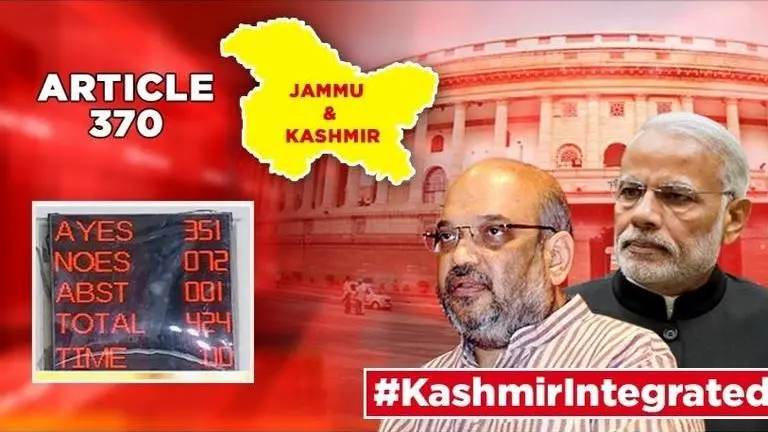Updated 6 August 2019 at 21:09 IST
Historic: Lok Sabha passes resolution revoking Article 370 in J&K, Reorganisation bill with stunning majority
In a historic moment, the Lok Sabha on Tuesday smoothly passed the resolution revoking Article 370 from Jammu & Kashmir and the Reorganization Bill, 2019
- India News
- 0 min read

In a historic moment, the Lok Sabha on Tuesday smoothly passed the resolution revoking Article 370 from Jammu & Kashmir and the Reorganization Bill, 2019 thereby integrating the state with the rest of India. In a convenient victory for PM Narendra Modi-led government, the Centre passed a bill changing the landscape of J&K. The event has been marked by celebrations across India.
See the numbers of votes for both Bill below:
Article 370 from Jammu & Kashmir
Votes for Reorganisation Bill, 2019 was passed with 370 votes in favour of it, 70 votes against it. Both the Bills were passed in the Rajya Sabha on Monday facing minimum votes saying 'no'.
Loud cheers for PM Modi's entry in Lok Sabha
Prime Minister Narendra Modi was greeted with loud cheers by BJP MPs in the Lok Sabha on Tuesday as he entered the house amid the ongoing debate on Article 370. Surrounded loud cheers of 'Bharat Mata Ki Jai' and heavy thumping of desk by the BJP MPs in Lok Sabha, PM Modi came to the house and sat on his seat beside Defence Minister Rajnath Singh. All BJP MPs gave a standing ovation to PM Modi and welcomed him in the Lower House.
Advertisement
What is Article 35 A?
Incorporated in the Constitution by a 1954 Presidential order, Article 35 A defines the permanent residents of the state of Jammu and Kashmir by giving special rights and privileges to the state subjects. It stems from Article 370 that gives an autonomous right to Jammu and Kashmir. The article is also referred to as Permanent Residents Law and bars woman belonging to the state from any property rights if she marries a person from outside the state. Even the children of such women do not get the right as they do not have any succession rights over the property.
Advertisement
What is Article 370?
It exempts Jammu and Kashmir from following the Indian Constitution except for Article 1 and itself. It also restricts Parliament's legislative powers in Jammu and Kashmir. It was passed in the Constituent Assembly on May 27, 1949 and is the first article of Part XXI of the Indian Constitution. The heading of this part is ‘Temporary, Transitional and Special Provisions’
Published By : Apoorva Rao
Published On: 6 August 2019 at 19:45 IST

